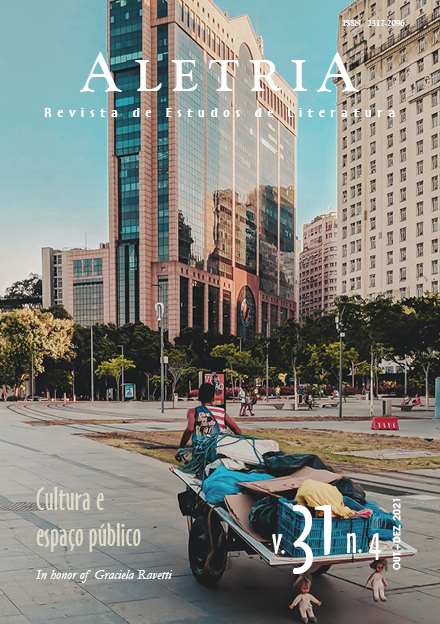Displacements and Welcoming Spaces in the Writing of a Survivor
a Levinasian Reading About the Female Faces of Scholastique Mukasonga in her Literary Works
DOI:
https://doi.org/10.35699/2317-2096.2021.33193Keywords:
face, surviving writing, liminal space, testimony, Scholastique MukasongAbstract
This article, in dialogue with Levinas’ thinking, makes an ethical reading of literary texts, showing how the concepts of face, testimony and substitution can displace us and bring us closer to another who reports his pain. We then approach the female faces of Scholastique Mukasonga to elaborate, from a Levinasian perspective, an exercise in ethical reading of some of her texts: Baratas (2006); A mulher dos pés descalços (2008) and Nossa Senhora do Nilo (2012). The three works can be understood with a testimonial cycle by the author, addressing issues related to Rwanda and the 1994 Tutsi genocide. We address specificities related to the feminine, their faces manifested in writing (said) and in the voices (saying) that narrate violent situations, sometimes nameless and borderline between suffering and horror. These works produce important shifts in the experience of trauma and face it, creating spaces for survival and hope.
Downloads
References
BENJAMIN, Walter. Sobre o conceito da história. In: ______. Magia e técnica, arte e política: ensaios sobre literatura e história da cultura. Tradução de Sérgio Paulo Rouanet. 7.ed. São Paulo: Brasiliense, 1994. p. 222-232
CHALIER, Catherine. As matriarcas: Sara, Rebeca, Raquel e Lia. Prefácio: Emmanuel Levinas. Petrópolis: Vozes, 1992.
DENIS, Marie. Catherine Chalier, Les Matriarches, Sarah, Rebecca, Rachel et Léa, éd. du Cerf, 1985. In: Les Cahiers du GRIF, n°32, 1985. l'indépendance amoureuse. pp. 152-153.
DERRIDA, Jacques. Hospitality. Angelaki, v.5, n.3, 2000, p.3-18.
DERRIDA, Jacques. Adeus a Emmanuel Levinas. São Paulo: Perspectiva, 2004.
DERRIDA, Jacques. The principle of hospitality. Parallax, v.11, n.1, 2005, p.6-9.
DERRIDA, Jacques. Demorar, Maurice Blanchot. Florianópolis : Editora UFSC, 2015.
DUBOST, Matthieu. Féminin et phénoménalité selon Emmanuel Levinas. Les Études Philosophiques, v. 3, n. 78, p. 317-334. 2006.
LEVI, Primo. É isto um homem? Rio de Janeiro: Rocco, 1988.
LEVINAS, Emmanuel. Difícil Libertad: Ensayos sobre el Judaísmo. Madrid: Caparrós Editores, 2004.
LEVINAS, Emmanuel. De outro modo que ser ou para lá da essência. Lisboa: Centro de Filosofia da Universidade de Lisboa, 2011 (Publicado originalmente em 1974).
LEVINAS, Emmanuel. Totalidade e Infinito. Lisboa: Ed. 70, 1980.
LEVINAS, Emmanuel. Alterité et transcendence. Paris: Fata Morgana, 1995.
LEVINAS, Emmanuel. Deux dialogues avec Emmanuel Lévinas.In: PONZIO, Augusto. Sujet et altérité sur Emmanuel Lévinas. Paris : L’Harmattan, 1996, p.143-151.
LEVINAS, Emmanuel. Quatro leituras talmúdicas. São Paulo: Perspectiva, 2015.
MENEZES, Magali Mendes de. O pensamento de Emmanuel Lévinas: uma filosofia aberta ao feminino. Estudos Feministas, v.16, n.1, 2008, p.13-33.
MUKASONGA, Scholastique. A mulher dos pés descalços. São Paulo: Editora Nós, 2017.
MUKASONGA, Scholastique. Baratas. São Paulo: Editora Nós, 2018.
MUKASONGA, Scholastique. Nossa Senhora do Nilo. São Paulo: Editora Nós, 2017.
RIBEIRO, Luciane. A Subjetividade e o Outro: ética da responsabilidade em Emmanuel Levinas. 1a. edição. São Paulo: Ideias&Letras, 2015.
RODRIGUES, Carla. Duas palavras para o feminino: hospitalidade e responsabilidade. Rio de Janeiro: Nau Editora, Faperj, 2013.
RODRIGUES, Carla. A costela de Adão: diferenças sexuais a partir de Lévinas. Estudos Feministas, v.19, n.2, p. 371-387, 2011.
SANDFORD, Stella. Levinas, feminism and the feminine. In: CRITCHLEY, Simon; BERNASCONI, Robert (eds.). The Cambridge Companion to Levinas. London: Cambridge University Press, 2002, p.139-160.
SEBBAH, François-David. L'éthique du survivant. Levinas, une philosophie de la débâcle. Paris: Presses universitaires de Paris Nanterre, 2018.
VENANCIO, Mariana. Inclina teu cântaro para que eu beba: o feminino pelos olhos da autora javista do pentateuco. Seminário Internacional Fazendo Gênero 11 & 13th Women’s Worlds Congress (Anais Eletrônicos), Florianópolis, 2017, ISSN 2179-510X, p.1-12.
WYSCHOGROD, Edith. Language and alterity in the thought of Levinas. In: CRITCHLEY, Simon; BERNASCONI, Robert (eds.). The Cambridge Companion to Levinas. London: Cambridge University Press, 2002, p.188-205.
Downloads
Published
How to Cite
Issue
Section
License
Copyright (c) 2021 Ângela Cristina Salgueiro, Frederico Vieira (Autor)

This work is licensed under a Creative Commons Attribution 4.0 International License.
Authors who publish with this journal agree to the following terms:Authors retain copyright and grant the journal right of first publication with the work simultaneously licensed under a Creative Commons Attribution Non-Commercial No Derivatives License that allows others to share the work with an acknowledgement of the work's authorship and initial publication in this journal.Authors are able to enter into separate, additional contractual arrangements for the non-exclusive distribution of the journal's published version of the work (e.g., post it to an institutional repository or publish it in a book), with an acknowledgement of its initial publication in this journal.Authors are permitted and encouraged to post their work online (e.g., in institutional repositories or on their website) prior to and during the submission process, as it can lead to productive exchanges, as well as earlier and greater citation of published work (See The Effect of Open Access).





